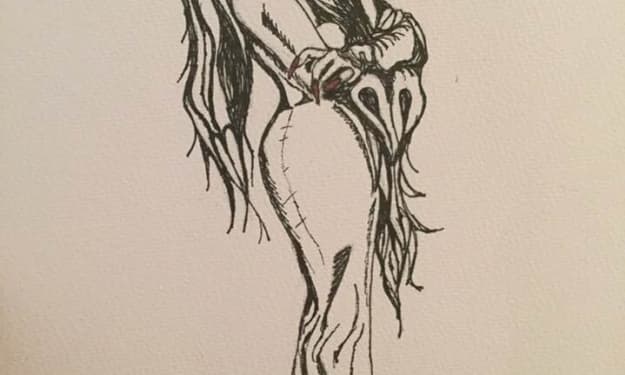Mary and the Monster
The Writing of Frankenstein

Mary, Mary quite scary, how does your writing go? With lightning strikes and cadaver parts, and pretty skulls all in a row. Mary Godwin’s mother made her a writer, but didn’t live long enough to raise her. Mary Wollstonecraft, a girl who had always argued that women were meant for more than the home and confinement bed died there, her very womb poisoning her from the inside out. Mary had been born of death, a fact she never really could forget.
Mary’s father moved on, but not really. He got remarried but he sunk deep into an obsession with galvanism, the concept that, with the help of electricity, things could indeed be brought back from the dead. Scientists had made a beheaded convict’s spine arch. They had shocked a frog to dancing. They had set the severed head of a hound’s teeth to chattering, its eyes rolling back into its cold skull as if in heavenly ecstasy. Who was to say, that in time, a beloved wife could not also be resurrected from the grave? Mary’s father awaited that day like the second coming, as if this would be the only revelation capable of saving him. He studied up, pored over anatomy texts with a Biblical seriousness, learned all he could to bring this morning closer to rising. He never lived to see the day.
Haphazardly, in writing through his angst, Mary’s father gained a following, a stalker, a poet by the name of Shelley. Shelley believed, above everything, above God and devil too, in the sublime. Sublimity and beauty are kissing cousins. The sublime was something he found in poetry, something so awe inspiring, so terrifyingly grand that it made you question your very existence on this earth. Shelley found this in the sixteen year old Mary Godwin. He had a wife, a child, but Shelley and Mary would meet clandestinely after dark, on the packed, damp dirt above Mary Wollstonecraft's grave. Together, hand finding palm, mouth tracing lips, they would try to find God, find new life amongst all this death. A resurrection had taken place at the gravesite, just as Mr.Godwin had prophesied, it just wasn’t the one he wanted or expected.
Mr.Godwin was left with a note. Mary had run away with Shelley, to the continent, a love child in her stomach and a married man on her arm. Mr. Godwin had long ago abandoned his faith in God and convention, but this scandal was just too much. He abandoned his faith in Mary as well.
For a time, traveling in love, in a fog of domesticity and poetry, Mary was happy, painfully and brilliantly happy. It was the kind of happy that makes you wonder not if but when something will go wrong. The wondering was answered in blood one morning, seeping through her sheets with the confidence of ink on a page, rewriting everything she thought she had come to know about her story. Shelley held her close, tucked a stray hair behind her ear, kissed her forehead as if she were herself a child. He told her not to worry, there would be another. Mary nodded along dumbly then. In the light it was easy to agree, easy to forget. But in the night, with Shelley snoring beside her in some borrowed bed or other, she fell prey to nightmares. She dreamed her little baby had come back to her, even as her body grew to accommodate a second child. She was doomed to always love that which she had lost, everything that couldn’t be salvaged. She would always find herself praying for a resurrection. She was, after all, her father’s daughter.
The writing of it went as you’d expect. It was a dark and stormy night, somewhere in Europe. Notorious playboy, poet and all around delinquent, Lord Byron, had just proposed a scary story contest for the writers gathered at the manor there; Mary, Shelley and Byron’s doctor. Mary didn’t like Byron, her young stepsister was his newest plaything. Her sister gazed upon Byron as if he had placed the moon in its orbit. Byron had trouble keeping his eyes above her neckline. Mary had little patience for men who couldn’t look you in the eye. She was determined to win the contest, but at only eighteen, she was intimidated by these older, more learned men. The only thing Mary had gained in her eighteen years on this Earth were the two children she had buried underneath it. She had no accolades, no publications, no degrees. Who was she to tell these people anything? So she did what most great writers do best, she procrastinated.
Mary would tell people later that Frankenstein was birthed from a nightmare. In her sleep she had seen a man, no, a monster, stitched together with mismatched corpses and good intentions. His yellowed and bloodshot eyes had looked into her soul as though they knew each other, had known each other since before time began. The visage was horrifying. She awoke wondering how she could make her story as blood curdling as all that. If she could somehow put into words the unspeakable horror it was to not be able to bury the dead. People would wonder later, at how Mary was able to take something as hope-soaked and sacred as resurrection and spin it so rot and awful. Mary never questioned it. Frankenstein was what happened when you tried to chase death with more life, when you tried to replace what had not yet been properly grieved for. Mary told people that Frankenstein was birthed from a nightmare, but what she never spoke of was what trouble she had waking up.
About the Creator
Aliza Dube
I am a recent graduate of the BFA in Creative Writing program at the University of Maine at Farmington. I am currently living with my boyfriend and cat in Kansas, cause why not? I am currently seeking publication for a memoir manuscript.






Comments
There are no comments for this story
Be the first to respond and start the conversation.